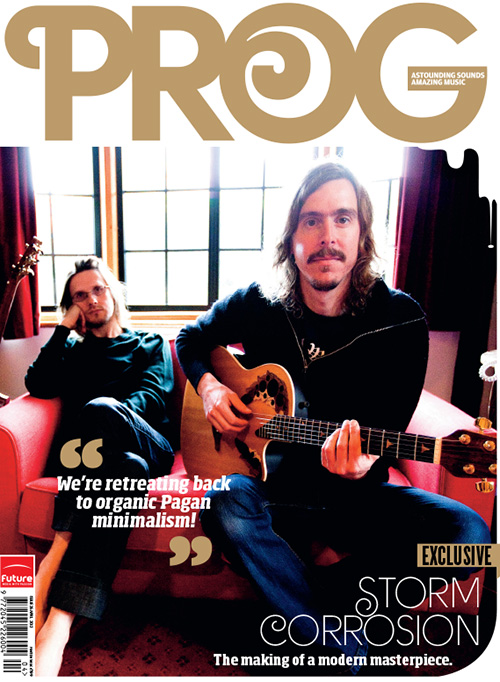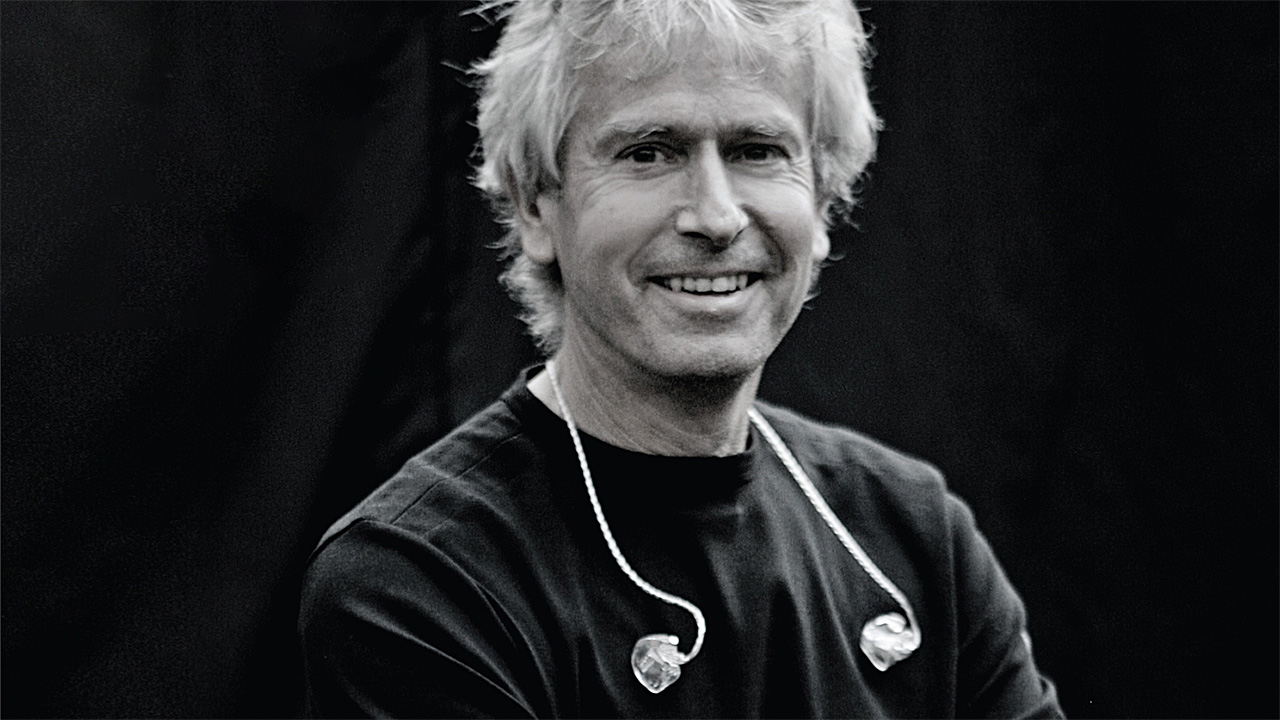In 2012 Tony Banks released his ninth solo album, the classically-based Six Pieces For Orchestra. Ahead of the launch he looked back on his career outside Genesis; telling Prog that, regardless of the highs and lows, his solo output had always been “a little bit more progressive.”

A founding member of Genesis, Tony Banks has sold millions of albums and played live to millions of people – but would you recognise him if you saw him in your local supermarket? The legendary keyboardist thinks not. “I’m very glad to be able to walk down the street in a way that Phil Collins can’t,” he says, sitting in his management’s offices in south London. “Even Mike Rutherford is more naturally recognisable than me – he’s got a more distinctive look – but I’ve got no problem with that.
“Phil became so big for a bit in the 70s and 80s, so when people want to be rude about someone in the pop world, he tends to come to mind for a lot of people,” he continues. “And yet those very same people would also still admit that In The Air Tonight has got one of the best drum riffs of all time. It’s just one of those things where he became the butt of the jokes. I feel like I get a lot of the benefits of having had a good career without the downside.”
Perhaps there’s one – his solo albums have had to sell purely on merit to a much greater level than if he had the level of publicity his bandmates have had. But Banks doesn’t seem bitter in the slightest that his solo career has never really taken off. “I don’t think you can make any comparisons, really,” he says.
“I think singers tend to carry the audience with them. I don’t resent it; but I would’ve liked something that stood up on its own because there would’ve been a sense of satisfaction. A Curious Feeling did okay, but the other ones after that, particularly Still – which I thought was pretty good – and Strictly Inc. … I thought those could’ve done a lot better.”
Most of those records were made while Genesis were still together; and for journalists interviewing the band, who hadn’t done the research they ought to have, tricky questions arose. “With Mike doing really well too, there was a slightly difficult thing where in interviews they’d talk about Phil’s career and then about Mike And The Mechanics, and then they'd come to me.
“They’d say, ‘So what have you been doing, Tony, while these guys have been in the charts all over the place?’ I’d made records too. It takes just as long to make a record that isn’t a success as it does to make one that is. But I had a fantastic career with Genesis, so I can’t really complain.”
Banks knows which side of his bread is buttered. He bats off suggestions that launching a solo venture was tough after such a successful career in a scene-changing band, pointing out that he’s had a successful career in a scene-changing band. “If I hadn’t stuck with Genesis in the early days, I wouldn’t be in the music business at all,” he says. “I don’t really have whatever it is that reaches straight out to the people; that commercial quality.”
It’s a good point – so, after over 30 years and nine solo albums, how does Banks view his solo work? “It’s one for the Genesis collectors if they want to be completist,” he says, after a few moments thought. “In terms of music writing, from my own point of view, I feel that some of the best things I’ve written have been as a solo artist.
Fish finds it difficult to sing a composed melody… Toyah doesn’t let her voice have free reign
He points out a significant benefit Genesis brought him: “It gives you the freedom to do it. And you have the ability to attract one or two good players. I love that ability to use different people – that’s half the fun.” He’s indulged himself in hiring some of the most illustrious singers around. “They’ve got to try and keep their personality but also do what I want them to do.
“Some people think that’s rigid, and they find it difficult to vary from what you’ve done. The best singers, like Nik Kershaw, are able to do their own thing with it. He’d sing a harmony straight away and he’d ask if I liked it and then do another.”
Banks worked with Kershaw on 1991’s Still. He also collaborated with Fish on the same album. “Fish finds it difficult to sing a composed melody – although one of the songs I did with him, Angel Face, was a very structured melody and he sang it very well. He wrote the lyrics to another piece on that album, Another Murder Of A Day. What I did was see what came to him naturally, and I used a bit of that – arranged it and changed it. To get something out of a voice like that, it was better to let him do what he does naturally.”
Banks says Kershaw was his favourite vocalist; but he also has fond words for Toyah, with whom he worked on the music for the 1984 sci-fi film Lorca And The Outlaws. “I thought she did a great job on Lion Of Symmetry, particularly on the middle part of that. I think she sounds fantastic,” he says, before a caveat. “She doesn’t let her voice have free reign. The producers that she’d been working with previously had limited what she’d been doing. I told her to just sing anything that came into her head. I just thought she needed to let go a bit.”
But the drummers he’s worked with give him most excitement. “As well as Phil and Chester Thompson, I’ve played with Steve Gadd, Vinnie Colaiuta, John Robinson and Bill Bruford. Given the quality of drummers that I’ve used over the years, I should’ve had more success.”
A review for Seven said it was ‘surprisingly pleasant considering where it came from,’ which was… a certain way of putting things
Perhaps. His debut solo album, A Curious Feeling, was released in 1979 while Genesis were a Top 10 band. It remains his favourite of his own records. Four years and a soundtrack later, he released The Fugitive, which was “more straightforward because I was singing it and I needed to do something that I could cope with.”
And yet it’s much more than a straight-ahead rock record. “My solo albums have always been a little bit more progressive, if you like, than the Genesis albums,” he says. “Even with Genesis we were never aware of the divisions as we were going through it. We were just writing; and it’s what appeals to you at the time.”
That’s one of the reasons Banks is releasing his second classical album, Six Pieces For Orchestra. “I don’t feel like I have to hold myself in at all in terms of harmonic structure and range,” he explains. “It all becomes much more expansive, much like it was in those earlier albums.
“In 1983 I did The Wicked Lady soundtrack and I really liked the way the orchestra sounded,” he says of his move into classical music. “I had a theme I’d decided not to use on The Fugitive; it sounded better with the orchestra than it ever did without. So I always had the thought that doing it again would be good. That’s why I did 2004’s Seven: A Suite For Orchestra. It proved to be more successful than anything else I’d done up to that point, including A Curious Feeling.”
Banks says that he didn’t have anything planned after Seven, although he had a feeling his next project would have something to do with drums again. However, an 18-month world tour with Genesis got that out of his system, bringing him to Six.
“Seven wasn’t totally straightforward, but I was very satisfied with having done it,” he explains. “You learn so much when you do something for the first time; so I thought I’d do it again and see if I could get it more how I intended. I think I have – but subjective viewpoints are worth nothing at all.”
Has Banks come up against any problems or reservations by releasing classical albums as a rocker? It’s almost the inverse situation of legendary violinist and prog fan Nigel Kennedy, who started off his career as an orthodox musician before breaking out his rocker roots.
“You find a lot of negativity,” Banks admits. “The Telegraph review for Seven said it was ‘surprisingly pleasant considering where it came from,’ which I thought was… a certain way of putting things. It doesn’t matter whether it’s Jon Lord, Paul McCartney or Anthony Hopkins; they don’t go out there thinking, ‘Yeah, I really want to hear that.’ I do understand people having that attitude; but hopefully when they hear it, that changes.
People will buy your music because of your name – a lot of bad music has sold quite well for that reason
I personally think Six is a better record. I certainly think it’s likeable, and hopefully everything depends on the music itself. Where I come from means that some people will listen to it who otherwise wouldn’t have listened to it. It also means other people will dismiss it. Once you get a name, people will buy your music because of your name – a lot of bad music has sold quite well for that reason. I’m happier for people to buy it because they like it.”
That’s paramount for Banks, who isn’t a musician who believes in creating albums for himself. He looks for an audience. “I’m not one of those people who says they have to write to live. I don’t,” he says. “I love playing – but I’ve made about 20 albums of original music. I’m equally proud of all of them, successful or not, but putting them out was always an extremely depressing experience.
“It’s a bit like having babies. After you’ve just had a baby – if you’re a woman – the last thing you want to do is have another baby; but later you may find you do. It’s a bit like that with my solo albums.”


